#Quiara Alegría Hudes
Photo



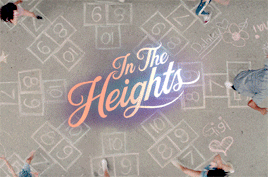






In the Heights (2021)
#In the Heights#filmedit#musical#Anthony Ramos#Leslie Grace#Melissa Barrera#Corey Hawkins#Stephanie Beatriz#Jon M. Chu#Quiara Alegría Hudes#my gifs#movie gifs
368 notes
·
View notes
Text

#musical theater#do you know this musical#poll#in the heights#lin manuel miranda#quiara alegría hudes#language: english
51 notes
·
View notes
Video
youtube
Lin-Manuel Miranda and the original Broadway cast of In the Heights perform at the 2008 Tony Awards.
“Lights up on Washington Heights, up at the break of day
I wake up and I got this little punk I gotta chase away
Pop the grate at the crack of dawn, sing
While I wipe down the awning
Hey ya'll good morning!”
#youtube#broadway musical#musical theatre#in the heights#lin-manuel miranda#karen olivo#olga merediz#christopher jackson#robin de jesus#andrea burns#janet dacal#thomas kail#quiara alegría hudes#seth stewart#alex blankenbuehler
2 notes
·
View notes
Photo

My Broken Language: A Memoir
By Quiara Alegría Hudes.
2 notes
·
View notes
Text
Quiara Alegría Hudes' 'My Broken Language' in a World Premiere at the Signature Theatre
You will enjoy Quiara Alegría Hudes' 'My Broken Language,' a musical about her past in North Philly.
(L to R): Samora la Perdida, Zabryna Guevara, Marilyn Torres in My Broken Language (courtesy of Julieta Cervantes)
Quiara Alegría Hudes (2011 Pultizer Prize winner for the play Water By the Spoonful), is widely known for what The New Yorker has described as her “exceptional body of work, at once lyrical and colloquial, playful and spiritual.” She is best known for co-writing (with Lin…

View On WordPress
#Alex Lacamoire#Ariacne Trujillo-Durand#Daphne Rubin-Vega#Lin Manuel-Miranda#Marilyn Torres#My Broken Language#Quiara Alegría Hudes#Signature Theatre#Yadira Correa#Zabryna Guevara
0 notes
Note
question: do you know which former coworkers or collaborators lin is closest with? he probably meets a lot with chris jackson (freestyle love supreme), he did that thing with leslie odom jr. in january, right? and the schuyler sisters cameoed in tick tick boom. but does he interact a lot with certain people? basically: who are his friends and why do i expect you to know this haha
ok, so like you said chris jackson for sure, they've been friends for such a long time, but i believe he is also still close with other fls guys (i definitely saw AT LEAST utk & shockwave on his instagram a few times), then tommy kail & alex lacamoire, he was also spotted with andrew garfield a few times (even last year) so i assume they are hanging out from time to time. now either i made it up or he said in one interview that quiara alegría hudes is literally his neighbour (they were working together on in the heights & vivo), so they are probably still friends too (sorry if that's a totally fake information but i feel too lazy to check it right now, i'm like 96% sure it's true tho). leslie, phillipa & renee, too, yes. he's also friends with john kander, they both confirmed haha. i wanted to say jordan fisher but i don't know, i think maybe? they're not besties but they are definitely close. i don't know, he is friends with a lot of people & this is just off the top of my head.
#it's so funny that you guys always assume i know everything & then it always turns out i... know... a lot#i probably need help#lin manuel miranda#lmm#anon#yes i got your letter yes i'm doing better*
11 notes
·
View notes
Text
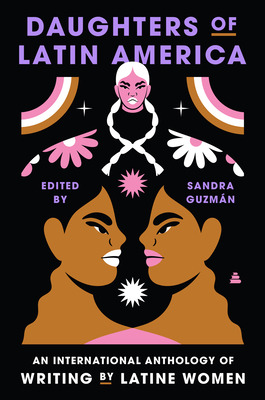
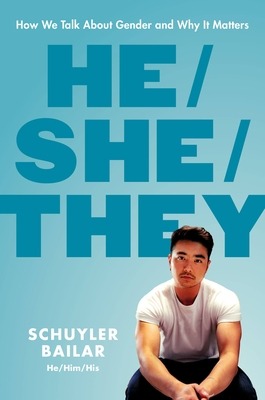

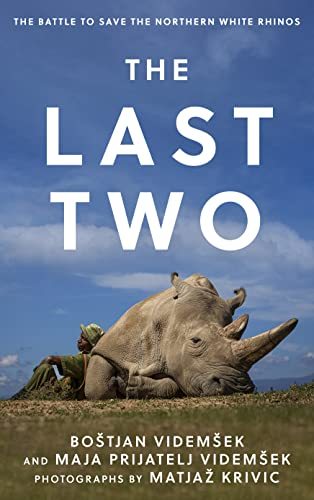
Nonfiction Thursday: New Book Picks
Daughters of Latin America edited by Sandra Guzmán
Daughters of Latin America collects the intergenerational voices of Latine women across time and space, capturing the power, strength, and creativity of these visionary writers, leaders, scholars, and activists—including 24 Indigenous voices. Several authors featured are translated into English for the first time. Grammy, National Book Award, Cervantes, and Pulitzer Prize winners as well as a Nobel Laureate and the next generation of literary voices are among the stars of this essential collection, women whose work inspires and transforms us.
An eclectic and inclusive time capsule spanning centuries, genres, and geographical and linguistic diversity, Daughters of Latin America is divided into 13 parts representing the 13 Mayan Moons, each cycle honoring a different theme. Within its pages are poems from U.S. Poet Laureate Ada Limón and celebrated Cervantes Prize–winner Dulce María Loynaz; lyric essays from New York Times bestselling author Naima Coster, Pulitzer prize-winning playwright Quiara Alegría Hudes, and Guggenheim Fellow Maryse Condé; rousing speeches from U.S. Representative Alexandra Ocasio-Cortez, and Lencan Indigenous land and water protector Berta Caceres; and a transcendent Mazatec chant from shaman and poet María Sabina testifying to the power of language as a cure, which opens the book.
He/She/They by Schuyler Bailar
Go‑to expert on gender identity, Schuyler Bailar, offers an essential, urgent guide that changes the conversation. Anti-transgender legislation is being introduced in state governments around the United States in record-breaking numbers. Trans people are under attack in sports, healthcare, school curriculum, bathrooms, bars, and nearly every walk of life. He/She/They clearly and compassionately addresses fundamental topics, from why being transgender is not a choice and why pronouns are important, to more complex issues including how gender-affirming healthcare can be lifesaving and why allowing trans youth to play sports is good for all kids. With a relatable narrative rooted in facts, science, and history, Schuyler helps restore common sense and humanity to a discussion that continues to be divisively coopted and deceptively politicized.
Schuyler Bailar didn’t set out to be an activist, but his very public transition to the Harvard men’s swim team put him in the spotlight. His choice to be open about his transition and share his experience has touched people around the world. His plain-spoken education has evolved into tireless advocacy for inclusion and collective liberation. In He/She/They, Schuyler uses storytelling and the art of conversation to give us the essential language and context of gender, meeting everyone where they are and paving the way for understanding, acceptance, and, most of all, connection.
The Golden Girls by Bernadette Giacomazzo
Over the course of seven years and 180 episodes, The Golden Girls altered the television landscape. For the first time in history, Americans (and, later, the rest of the world) were watching sexagenarians - and one octogenarian - leading active, vital lives. These were older women who had careers, families, lovers, and adventures, far from the matronly television characters of the past.
In The Golden Girls: A Cultural History, Bernadette Giacomazzo shows why this iconic sitcom is more than just comedy gold. She examines how, between all the laughs and the tales of St. Olaf, these women tackled tough issues of the time--issues that continue to resonate in the twenty-first century. From sexual harassment, ageism, and PTSD to AIDS, inter-racial relationships, and homosexuality, Dorothy, Rose, Blanche, and Sophia weren't afraid to take on topics which were once considered taboo.
The Last Two by Boštjan Videmšek
Meet Najin and Fatu—the last of the northern white rhinos—as well as the scientists, conservationists, and rangers who are fighting for the species’ survival. The last two remaining northern white rhinos, an already functionally extinct species, are kept behind three electrical fences and protected by a squad of rangers at the Ol Pejeta Conservancy in Kenya. Both are descended from the last male northern white rhino, Sudan. Najin is his daughter, while Fatu is his granddaughter. Along with Sudan and another male named Suni, they were transferred to Kenya in 2009, in the hope that returning them to their natural habitat might help them regain their zest for life and reproduction.
Unfortunately, things didn’t go to plan. With the deaths of Sudan and Suni, the northern white rhinos’ destiny is now in the hands of their Kenyan caretakers and a team of scientists at the BioRescue international consortium, which is developing and using several different techniques to resurrect the species, including assisted reproduction and stem cell technologies. Will science prevail, or is it too late?
Journalists Boštjan Videmšek and Maja Prijatelj Videmšek explore this question by taking readers on a journey through the history of the northern white rhinos. They introduce the rangers, conservationists, and scientists fighting for the future of the northern white rhinos and dissect what led the species to the brink of extinction, from wars and climate change to poaching and the black market. The Last Two offers hope for the future of the environment and the fight to save the many species that call Earth home.
#nonfiction#new books#library books#reading recommendations#reading recs#book recommendations#book recs#tbr#tbr pile#to read#booklr#book tumblr#book blog#library blog#readers advisory
4 notes
·
View notes
Text
In the Heights Stage vs. Film
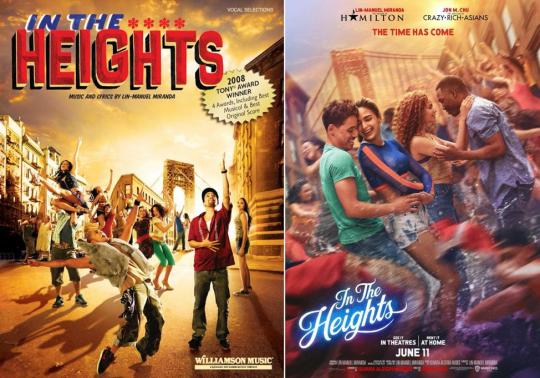
(Originally posted on August 1, 2021)
Ever since I began recognizing the cultural and historical similarities between the Philippines and Latin America, a result of Spain colonizing the Philippines 500 years ago, supporting talented Hispanic/Latin American entertainers has felt about as important to me as supporting talented Asian entertainers does. Consequently, I eagerly awaited the movie adaptation of Lin-Manuel Miranda’s and Quiara Alegría Huedes’ Broadway musical In the Heights, about Hispanic/Latino/Latina Washington Heights residents trying to enjoy the last summer before their block’s gentrification. I felt that a look at the film – the first I saw in a cinema since Sonic the Hedgehog – would fall under my blog’s scope, thanks to Jon M. Chu’s direction.
I felt pretty familiar with In the Heights by the time the movie premiered: I own the Original Broadway Cast Recording, and attended a high school production. Compared to the other Lin-Manuel Miranda musicals I’ve seen on a screen, the movie would fall in the middle; the stories feel less engaging than Moana; but I find the characters more sympathetic than those from Hamilton. To explore the methods Chu, Miranda, and Hudes used to update the 2008 Broadway musical for 2020-’21 moviegoers, I’ve decided to examine their cinematic adjustments to one of the play’s literal showstoppers.
Look at the fireworks fly, light up the night sky!
-The whole cast, "Blackout"
On stage, "Blackout" dramatically ends both Act I, and the characters' Fourth of July festivities, when electricity in Washington Heights shuts down for the first of several nights. The movie doesn't have an intermission, and moves the emotionally powerful "Paciencia y Fe" and "Alabanza" to follow "Blackout" on the same evening. This required the writers and Chu to ensure that "Blackout" excites, but doesn't emotionally drain the viewer when combined with the following songs.
The film streamlines the drama of "Blackout" by emphasizing its most optimistic theme. On stage and film, the number demonstrates that while a disaster can frighten, it can also bring family and friends closer together: Sonny and Graffiti Pete rally to lessen panic on their block, Usnavi and Abuela Claudia share a rare look at the stars, and Nina and Benny reinforce their love. On stage, Sonny and Graffiti Pete fail to protect the bodega from looters during the blackout, delivering another reason for Usnavi to consider leaving Washington Heights in Act II. Retaining this in the movie would've provided a darker spin on the song's theme, but would've also reinforced destructive stereotypes of short-tempered, selfish Latin Americans. From a pacing standpoint, devastating the community twice in the same night - including "Alabanza" - would risk exhausting moviegoers. Consequently, everyone in the movie remains focused on finding shelter in the scorching darkness, with Sonny and Graffiti Pete pyrotechnically guiding their neighbors. Even without any onscreen violence, Chu ensures high levels of tension and chaos with his hyper-realistic direction, and by utilizing more locations than just the nightclub and the barrio.
Since In the Heights marks the first of several Lin-Manuel Miranda musicals promoting the importance of a positive legacy, it feels noteworthy that by removing any active efforts to destroy the block from within, Usnavi's temptation to retreat from Washington Heights remains the greatest threat against ensuring the residents' impacts. It looms larger in the movie than it did on stage, where it takes until the second song of Act II - "Hundreds of Stories", which didn't make it to the screens - for his dreams of returning to the Dominican Republic to seem more like an attainable goal. In the film, he starts turning his dreams into plans right after the first song.
On screen, "Blackout" accommodates some movie-wide examples of streamlined or added drama by relocating one verse, adding some more lyrics, and changing who sings it. On stage, the number ends with some will-they-or-won't-they between Nina and Benny, who ultimately close Act I with a kiss. The film reduces the number of obstacles in their romance, complicated originally by both Nina's difficulty finding the confidence to return to Stanford, and by her father, Kevin, preferring that she date another Hispanic or Latino. Instead, Kevin and Benny seem to get along mostly well; this particular sequence illustrates it when they cooperate to direct other taxi drivers from the dispatch. Nina's and Benny's subplot remains engaging through her poignant quest to figure out how she can forge her own legacy, while still honoring her family and friends. All of this leaves them without much reason to sing an argument.
The movie instead gives the will-they-or-won't-they verse of "Blackout" to the main couple, Usnavi and Vanessa. After the play separates them in the chaos, they don't reunite until the next morning, in a conversation that puts the future of their romance in doubt. The film reunites them on the night of the blackout, but separates them again in song. I'll admit considering their love the least interesting In the Heights subplot; whether on stage or on a screen, they seem to spend more time pining or disagreeing than actually doing anything amorous. However, Chu adds tension to their arguments by filming both this verse and "Champagne" in sweeping, uninterrupted takes. Having Vanessa willingly split up with Usnavi during the blackout also allows her to advance on her project of designing fashion inspired by Washington Heights, as part of a film-exclusive character arc. While most of her development in the libretto involved falling deeper in love with Usnavi, the screenplay also has her strengthen her admiration of the barrio's beauty.
The movie relocates Usnavi's return to Abuela Claudia to before the final chorus of "Blackout", now optimistically preceded with their echoed assurances of, "You're not alone tonight!" It also drives home the theme of a disaster's potential to unite, by having several other major characters spend the night with the duo. Although, the verse only ends with those assurances because of the screenplay altering the time and manner in which Abuela Claudia shares some surprisingly positive news with Usnavi. The new time makes her seem a little more senile than her stage counterpart, but the manner still delivers a resonant example of her helping Usnavi and Sonny when they don't expect it.
While "Blackout" creates fewer dilemmas than it does on stage, it remains dramatic by leaving some problems to resolve later. In addition to the uncertain future of Usnavi's and Vanessa's romance, Washington Heights still requires several days to regain power. With no intermission, the film appears to deliver a breather by instead moving "Paciencia y Fe" to this point. Set almost entirely in Abuela Claudia's heat-stricken mind, the flashback-driven number originally followed "96,000" both in the play, and in early edits of the movie; the ending also received some new lyrics for the screen. In the final edit, "Paciencia y Fe" provides an intimate contrast to "Blackout", before dropping a tragic bombshell on the barrio and viewers.
While In the Heights experienced a lot of restructuring and streamlining during the transition from Broadway to movie theaters, it remains an emotionally compelling watch. Not all of my favorite songs made it to the screen, but not all of them feel easy to film, anyway. Jon M. Chu's direction of the film remains energetic, yet doesn't frantically distract from the poignant character arcs - some of which feel more complete in the movie than in the play. Both versions of the musical impress when after spending hours following average people live their ordinary lives, they elicit the viewers' interest in keeping the residents' stories alive. Television might diminish the thrills of In the Heights, but the passionate and resonant film would still benefit greatly from a fruitful second life on home video and broadcasts.
2 notes
·
View notes
Text

To celebrate a season of “My Broken Language, join us ONLINE at 5:30PM EST. for a conversation with featured author Quiara Alegría Hudes; louie ortiz-fonseca, the founder of Gran Varones, a platform for history, culture, and community storytelling through a Black Latinx queer lens; and Roberto Lugo, Philadelphia artist, ceramicist, activist, poet, and educator. In-person tickets for their discussion, “A Library of Us: Archive Builders In Conversation,” are SOLD OUT, but you can watch online!
REGISTER FOR FREE

Afterward, join us at 7:00 p.m. around the corner in Taller Puertorriqueño’s courtyard for a dance party with free food from Boricua Restaurant, a cash bar, and music by DJ Jorge.
REGISTER FOR FREE
One Book, One Philadelphia is a project of the Free Library. The 2022 One Book season of events runs from April 27 to June 15. Please visit freelibrary.org/onebook for the full calendar of book discussions, panels, and creative workshops for all ages.
4 notes
·
View notes
Text
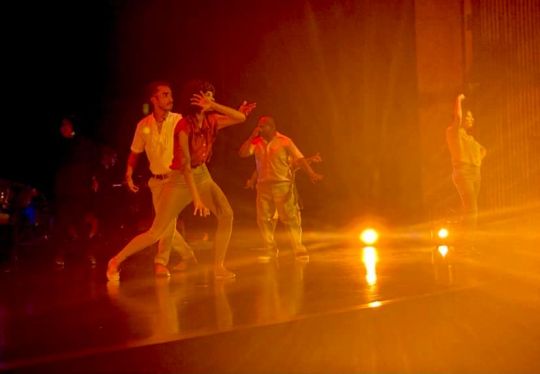
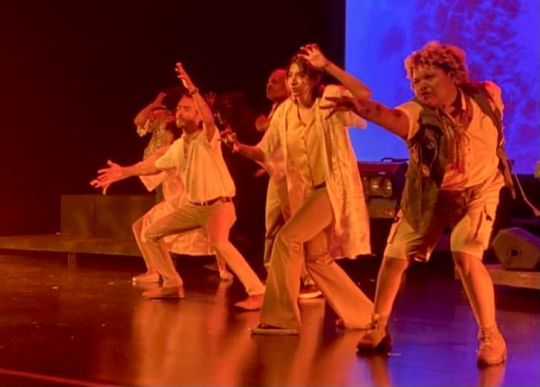
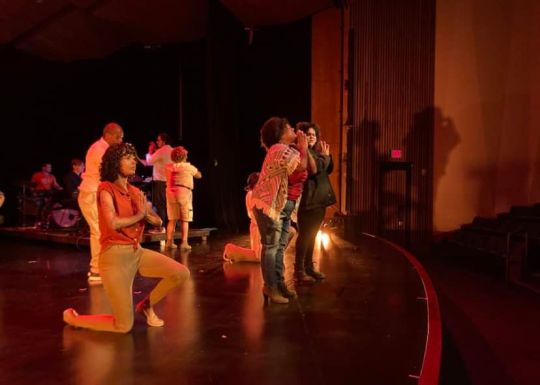
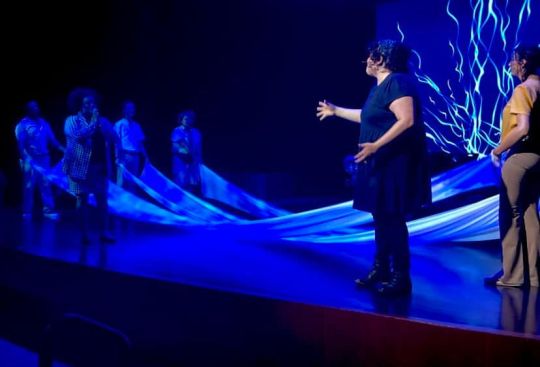
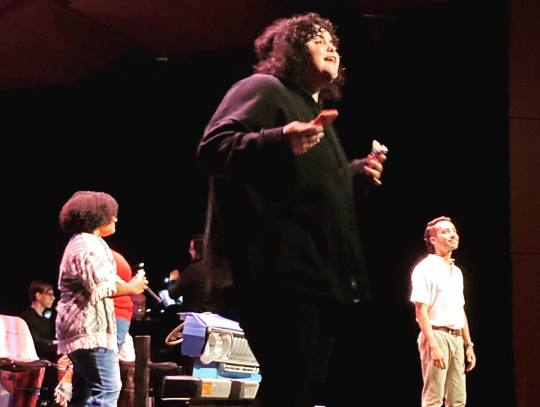

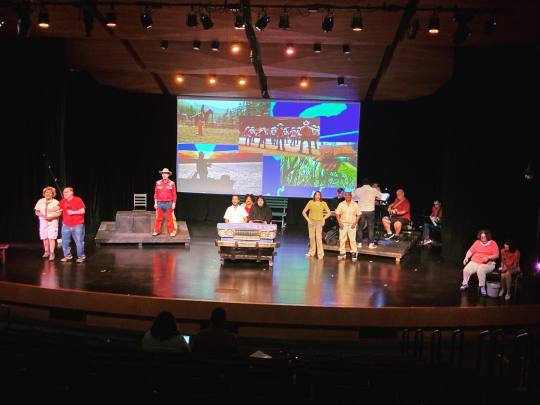
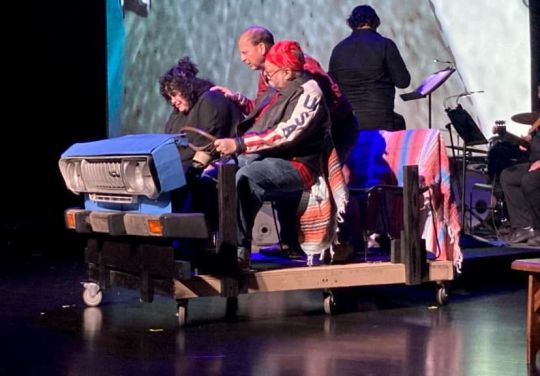


Director's Notes
Welcome to Teatro Paloma and Creative Works of Lancaster’s co-production of Quiara Alegría Hudes’ Miss You Like Hell! This show is Teatro Paloma’s first ever musical production, and it’s been our most ambitious project to date. Miss You Like Hell’s contemporary energetic story, various modern rhythms, and eclectic choreography also contains an important reminder of the daily reality facing so many undocumented families nationwide. The show’s playwright Quiara Alegría Hudes has said that, "art has a lot of stories that must be told right now about our humanity, the truth of our culture, the meaning of life and the human soul—and that can be white, that can be black, that can be mixed, that can be Latino, but it’s about being human.”
Since Miss You Like Hell’s publication in 2018, a year before the pandemic, the show has only been produced a few times. We’re very excited to bring this story to Central PA for the first time! Underneath the show’s free-spirited nature is an exploration of the latent threat of disenfranchisement and the importance of family. We follow the story of Beatriz, who sings, “You don’t understand, looking over my shoulder, how unsteady I stand.” However, throughout their journey, Beatriz and her daughter Olivia collect and carry the human connections and allies they’ve made on the way. Their story poses the question to us the audience: Who belongs in this land? A quick look at the U.S. / Mexican border crisis easily shows the sad but real struggles underlined through Beatriz’s pursuit of belonging. Miss You Like Hell reminds us that musicals have the power to expose the territory where the political and the personal meet.
Thank you for being with us tonight. It continues to be such an honor to produce stories never told before, yet which contain urgent messages about change, belonging, and community-building with cariño (affection). We hope you enjoy the work of our immensely talented group of artists. And above all, after leaving the Ware Center tonight, remember… we are not castaways, we are not rafts, we are not even islands, we are the ocean!
Gracias,
José Rodríguez-Plaza and Maria Enriquez
Click here to see digital program
3 notes
·
View notes
Text

IN THE HEIGHTS
Music and Lyrics by Lin-Manuel Miranda and Book by Quiara Alegría Hudes
Directed by David Gram
Dramaturgy by Estefani Castro
University of California, Riverside Theater Department
ARTS Studio Theater
Riverside, CA. 2014.
0 notes
Text
If the Elliot trilogy comes to Broadway I will be very happy. If it comes to Signature as part of Quiara Alegría Hudes's residency I will be very happy.
0 notes
Note
what are your thoughts/wishes/worries for the Wicked movie(s)?
I think it has literally been 5 years since I got a (non-spam) ask omg.
I'm excited that it is finally happening! Cynthia Erivo is going to be fantastic in whatever she's in and I probably have more optimism for Ariana Grande as Glinda than most. I love Jeff Goldblum and I'm really excited to see his Wizard but also feels like he'll just play himself which i'm not sure is great for the wizard. Ethan Slater is perfect Boq casting.
I'm one of those kinds of people who enjoys pretty much any movie/musical they see so I'm sure I'll have a good time.
I wish it was only one movie. Like, I get there is a lot of source material but I'm almost worried by having two movies it'll be stretched too thin or they'll make the plot too complicated by adding unnecessary storylines.
I think Jon M Chu is a really talented director but I did question some of his choices with the In the Heights movies (although some of that might have been on Quiara Alegría Hudes) and I also wonder if Wicked is exactly his style so that'll be interesting to see how it melds, especially with the dance heavier numbers.
tl;dr: I'm sure I will have a good time at both movies regardless if I agree with every little change and I'll probably listen to the soundtrack on repeat for days straight
I'm curious what everyone else thinks / is looking forward to though!
0 notes
Text
The Courtroom Scenes in Miss You Like Hell and Zoot Suit
Sorry but not sorry to all my regular followers but I have thought way too much about these two plays lately so you’re getting a highly specific rant.

Credit: Universal/Courtesy Everett
In both shows, a “knowledgeable” character (El Pachuco and Beatriz’s lawyer) tell the “main character” (Henry and Olivia) there is little chance of them winning the case, and both cases end poorly (for the moment). Henry’s case ends dismally after a lot of racism and humiliation from the judge and prosecution (being made to stand repeatedly, not allowed to get clean clothes or a haircut), but with the hope of a future appeal should he choose it.

Credit: Zoot Suit (1981)
Henry and Olivia are very different characters, but they share an internal struggle: should they fight in court or not? Their reasons to not fight are very different, Henry is influenced by the defeatist voice of El Pachuco “Once a Mexican goes in [to prison], he never comes out.” (1353) and Olivia, who isn’t fighting for her own freedom but her mother’s, isn’t sure if Beatriz deserves her help. When Olivia first finds out Beatriz needs her to testify, she is upset that her mother would come get her seemingly out of concern then ask something so large of her (paraphrased from 34).
While Henry is fighting for his own freedom, someone he loves is also punished during the trial. Della is ordered to stay at the state school for girls, and the judge doesn’t even give a reason for this! (1352) This is also the moment when Henry loses some hope, because his lawyer informs him that they aren’t going to win the initial case, but an appeal. In Olivia’s case, she knows losing her mother is an option the entire time, even a likelihood. Her choice to testify, to fight in court, suggests that she has some hope of winning, though we don’t know how likely she thinks it is.
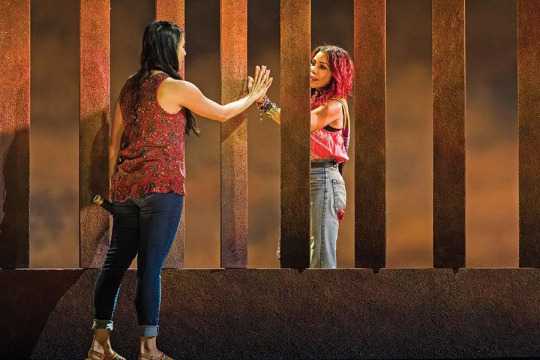
Credit: Jim Carmody/American Theater
The greatest difference between the scenes is probably the way they are placed in the story
Miss You Like Hell’s courtroom scene is the climax of the play, a deciding moment we have been building up to throughout the story. Olivia’s titular song is a partially true ode to her mother, and her actions are an expression of love, shes fighting for her mother in the way her mother didn’t fight for her in her parents separation. Their loss at the hearing is final, but not without hope as they meet again at the park and see each other, both literally and metaphorically. Zoot Suit’s court scenes are in the middle of the play. They are extended and contain more blatant injustice and racism, but the verdict is only a beat in the greater story, as there is still half a play left for the true fate of the 38th street gang to be revealed. In short, each scene embodies a different kind of hope.
Valdez, L. (1978). Zoot suit: A New American play by Luis Valdez. Center Theatre Group of Los Angeles
Hudes Quiara Alegría, & McKeown, E. (2019). Miss you like hell. Theatre Communications Group.
1 note
·
View note
Text
Tony Kushner, Meryl Streep, Lorrie Moore and Many More at 92NY
Photo © 92NY
92NY’S UNTERBERG POETRY CENTER UNVEILS ITS WINTER/SPRING LINEUP TONY KUSHNER, MERYL STREEP, ARIANA DEBOSE, SUZAN-LORI PARKS, BEN STILLER, LORRIE MOORE, CARL PHILLIPS, MIRIAM TOEWS, JOHN DOUGLAS THOMPSON, QUIARA ALEGRÍA HUDES, MAUD MARTHA, KAFKA’S DIARIES AND MORE
The 92NY Unterberg Poetry Center’s 84th season continues with a Winter/Spring lineup featuring beloved playwrights and…
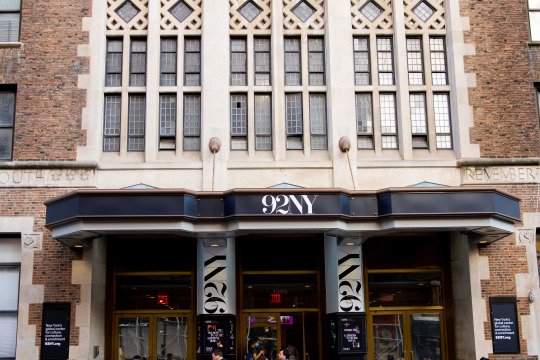
View On WordPress
0 notes
Text
Meet the Creative Team
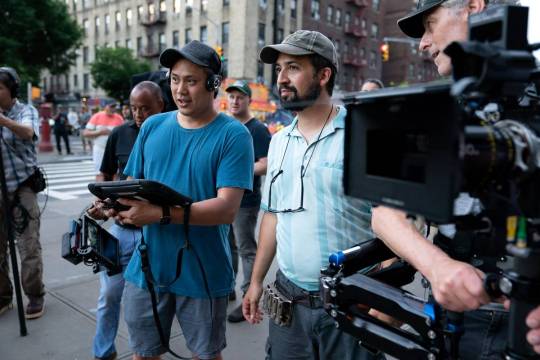
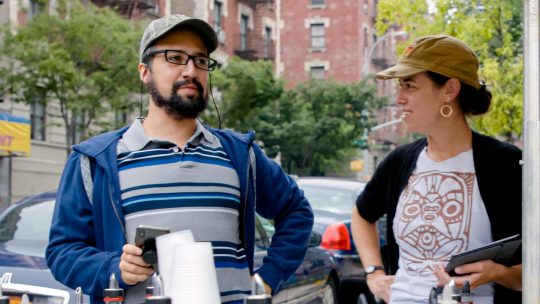
Directed by Jon M. Chu
Screenplay by Quiara Alegría Hudes
Based on the Musical Stage Play In The Heights:
Music and Lyrics by Lin-Manuel Miranda
Book by Quiara Alegría Hudes
Concept by Lin-Manuel Miranda
Film Release Date: June 10, 2021
Image sources: [x], [x]
0 notes